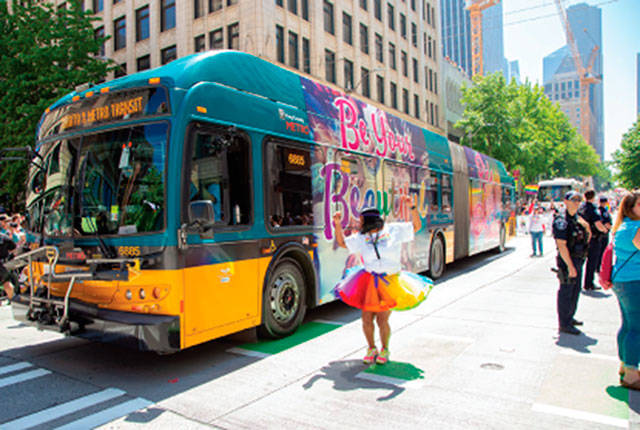The following was written by Public Health Insider staff:
In a first-of-its-kind effort, King County hospitals reached out to lesbian, gay, bisexual, transgender, and queer or questioning (LGBTQ) youth and young adults to learn about their experiences with healthcare. King County Hospitals for a Healthier Community, which is a collaborative of 11 hospitals and health systems, joined with Public Health – Seattle & King County to identify the greatest needs and assets of the communities they serve and develop plans to address those needs. More than 1 in 10 King County youth identifies as lesbian, gay, or bisexual.
A series of listening sessions with LGBTQ youth and young adults age 13-24 living throughout King County, plus interviews with advocates who work with LGBTQ youth, revealed consistent themes that were also supported by survey data. The themes at the heart of the just-released LGBTQ Community Spotlight include:
Lack of control of their own health:
For many LGBTQ youth, lack of family support affected mental health, self-esteem, and their ability to effectively navigate the healthcare system. Youth who had stable and nurturing relationships with their families and trusted adults felt safe and supported. Those without these trusting relationships had extreme difficulty getting their health and healthcare needs met. One youth said, “… this is my body, this is my mental health, this is me; I feel like I’m not in control over any of it.”
Many youth would like more opportunities to speak privately with their providers, without family present, and feel strongly that providers should take the lead in suggesting this option. A listening session participant offered a positive example: “One thing my [provider] does to make me feel safe is asking me about telling my mom. He’ll always give me the option, ‘Do you want your mom to come along?’ or if she’s there [he’ll ask] if she should leave. He always leaves it up to me.”
With providers, a need for safety, trust, and information:
Youth said they needed to feel safe and develop trusting relationships with their providers before they could comfortably talk with them about their physical, mental, and emotional health needs – all topics that are broader than just sexual health. According to one participant, “[My pediatrician]’s really supportive of everything. Before she asks questions, she says ‘do you feel comfortable if I ask this?’ and it’s really nice.”
Participants also stressed the importance of a safe and supportive clinical environment where inclusive language on intake forms and behaviors from staff and providers acknowledge the possibility of gender diversity
Youth also said they needed more information – about diverse aspects of human sexuality and healthy interpersonal relationships, as well as patient rights, confidentiality, and the kinds of services that can be accessed without parental consent.
Kudos for school-based health centers:
Middle and high school students with access to one of the 23 King County School Based Health Centers greatly valued the services and the privacy they provided. This is one of many enthusiastic endorsements: “They’re not only treating what’s wrong with you internally – they care about you all the way.”
Safety concerns across multiple settings:
In addition to explaining their need for “non-judgmental safe spaces” for healthcare services, youth expressed strong concerns about safety in their responses on a statewide survey of 8th, 10th, and 12th graders. Compared to students who identified as heterosexual, those who identified as lesbian, gay, or bisexual were significantly more likely to report feeling unsafe at school and on dates; they were also more likely to report that they had been bullied and that an adult had intentionally hurt them.
These safety concerns were echoed by the finding that more than half of LGBTQ+ respondents to the 2018 Count-Us-In survey of King County’s homeless population reported a history of domestic abuse or partner abuse.
Acknowledging the universal challenges of transitioning from childhood to adulthood, the report highlights the considerable variation in the ways this plays out with LGBTQ youth. Findings from the report can raise awareness among the parents, teachers, healthcare providers, and other trusted adults whose support is important to these youth as they navigate a vulnerable stage of development. Check out the full report to learn more about the findings and to read more from the participating youth and advocates.


